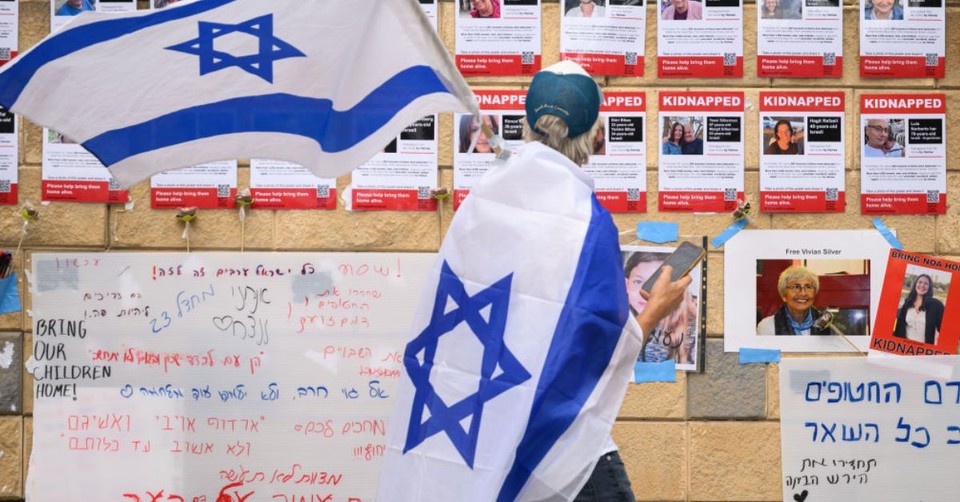Israel and Hamas Cease-Fire Deal Raises Questions about Israel’s Long-Term Safety

So now, the deal about vapid politicians parroted the imperative, “to get a deal done,” is now a done deal. Without a full analysis here and at this time, the deal does not create a permanent cease-fire, does not disarm Gaza, does not eliminate Hamas from Gaza, does not have terms for the release of ALL the 98 hostages, and has so many pitfalls that it could be violated at any stage in the first stage, 42 days during which 33 hostages, dead and alive, are slated to be released, in exchange for thousands of Hamas terrorists.
For the dead hostages, what will be returned are their remains, on which DNA tests and autopsies will have to be conducted rapidly so their loved ones can bury them. Some are not Israeli citizens, and their bodies will have to be repatriated to Africa, Asia, and Europe. Because of the nature of the Hamas terrorists who have been holding the hostages in captivity for nearly 470 days, before anything can happen, Israel will have to check the bodies for possible explosives as nothing in the wide range of evil can be ruled out from Hamas and other Islamic terrorists.
What’s not known is how many are already dead and how many hostages who are alive may be executed before they are returned, simply because if Hamas gets a deal they consider favorable, it won’t matter to them who is dead and who is alive. That’s why Stage One is dragged out for 42 days, so Hamas can drag out the suffering. Their currency is inflicting the most trauma and suffering on the greatest number of people. Hamas also has claimed they don’t know where all the hostages are, a fraud that could see the crisis dragged out indefinitely despite any deal.
This sets up the likelihood that maybe not all the hostages will ever come home. That possibility is being referred to as “Ron Arads,” the plural of the name of a missing Israeli Air Force officer who was captured in Lebanon in 1986. Though there have been signs of life, something Palestinian Arab, Hezbollah and Iranian terrorists taunted Israelis for years, neither he nor his remains have ever been found, released, and returned to Israel. Referring to Israel’s current hostages as “Ron Arads” indicates that some of them, like Arad, will never be heard from again.
It's safe to say that all Israelis want ALL the hostages released, but there are wide-ranging views on how and under what terms. It’s also safe to say that most Israelis are in the midst of P-P-PTSD: pre-, present, and post-traumatic stress disorder.
Before the deal has even begun to be implemented, the terms alone are creating national trauma. Releasing thousands of hardened terrorists to return to Gazan streets to perpetrate acts of terror that threaten all Israelis, creating pre-trauma. People who have been victimized by the terrorists to be released are also suffering pre-trauma, not knowing if the animals who shot, stabbed, blown up, or committed any other act of violence against them and their loved ones will ever be safe again. I have two friends who were attacked by Palestinian Arab terrorists, one whose sister was murdered, struggling with the possibility that the terrorists may be set free.
Pre-trauma also exists among those who have sacrificed themselves or whose loved ones have been killed in combat, worried that their loss will mean nothing as Israel risks agreeing to a situation that will arguably diminish its security, both by releasing terrorists and not completely eliminating Hamas.
Present trauma is experienced by the family members of the hostages, dead or alive, whether previously released or still in captivity. As they hold out hopes that all the hostages will be released but seeing reports that just 33 will be (initially), they also know that odds are low of being able to begin having closure on a disaster that befell them and their loved ones, and all of Israel, 15 months ago. How they are going on with life is unimaginable. Knowing that Hamas will continue to exact every ounce of suffering up until the last minute (as they did with the 105 released hostages in November 2023) is incomprehensible.
And post-trauma is experienced by all of us, mixed with present trauma. One thing that makes moving on in Israel today so difficult is that we are still in the midst of a war. Soldiers continue to be killed on a near-daily basis. Terrorists continue shooting and ramming vehicles into us, stabbing, and more.
Rockets and missiles continue to be launched from Gaza (yes, they still have plenty of rockets and the ability to fire them), from Lebanon, and from Yemen, as just happened again this week, sending millions of Israelis into their bomb shelters in the middle of the night. We can’t move on because the things that are inflicting trauma are still impacting us daily. The deal does not prevent this, it only handicaps Israel’s response, especially as long as hostages will remain in captivity.
The slew of rumors, spin, and speculation add to all the trauma, along with the inevitable politics. We’re living on bated breath. Everyone wants the hostages home, but not everyone wants that at any price, especially if the price will be more dead Israelis. How do we balance essential caution with necessary compassion? What’s the price of saving dozens of lives and bringing closure to their families while risking dozens more, or more, due to Hamas and other terrorists being strengthened?
There are rumors that Prime Minister Netanyahu gave in to areas he hadn’t felt were in Israel’s best interests until now due to external pressure. He’s balancing doing something that all Israelis want but differs on how and over which some members of his governing coalition may try to bring down the government to stop something that they feel is not in Israel’s best interest. Hostage families have chided Netanyahu for not doing enough to make a deal that would release their loved ones, and now some are critical of a deal that does not get them all released.
Our hearts break when we think about the hostages’ ordeal; we weep as we pray for them and when we hear the released hostages' unbearable stories from over a year ago. Is it possible to cry tears of joy and tears of grief at the same time? Actually, it is. It’s impossible to put ourselves in their situation or know how we might really respond if it were our child, parent, spouse, sibling, or grandparent being held in captivity.
We also know that the “mastermind of the October 7 massacre, Yahya Sinwar, was one of the terrorists released as part of a previous hostage deal, adding to the trauma of whether we are just setting ourselves up for more terror and suffering, with Hamas not fully eliminated from Gaza. How do we justify choosing life for the release of at least the first 33, with a deal that may lead to more death? What would you do?
Some feel that any deal that Israel’s enemies agree to is a bad deal because they will never stop trying to massacre innocent Jews and annihilate Israel. The thinking goes that if the terrorists think it’s a good deal, it’s bad for us. Indeed, Palestinian Arabs are celebrating their victory. Do they not feel any mixed emotions or remorse?
Returning hostages is the key, but it’s noteworthy that this deal calls for only one-third of the remaining hostages to be returned over several weeks, during which anything could happen that would cause Hamas to violate the deal. There are no specific terms it seems to secure the release of the remaining 65, even assuming that Stage One will be fully implemented. The 33 are a third as many as were released in 2023 over a period that was about half the time. Basically, Hamas wants to drag this on as long as possible and inflict as much trauma as possible and retain as many hostages as possible in captivity to suit their evil.
The other critical element of the deal is if and to what degree it ends the war, disarms or eliminates Hamas, or limits Israel’s ability to continue to fight and destroy the terrorists and their infrastructure. Many think that if Israel agrees to end the war without remaining in full control of Gaza to prevent the terrorists from reorganizing and rearming, we lose the bigger war against Islamic enemies who will be emboldened and able to continue to threaten, murder, and kidnap, all under the applause of a deal with global support.
This is just a snapshot at the gut-wrenching situation in which Israel finds itself, adding trauma to the trauma just in the discussion of it all, much less what the outcome will be. The good news is that most Israelis put their trust in God, even amid horrific situations that we have seen and experienced not just for 15 months but for decades. Hopefully, that is a comfort, and that the outcome will be good.
*The opinions in this commentary do not necessarily reflect those of Crosswalk Headlines.
Related Podcast: Breaking Down the Hostage Deal Between Israel and Hamas
Hosts Joel and Lynn Rosenberg tackle the emotionally charged and complex issue of Israel's latest hostage deal with Hamas. With Joel asserting that Israel is faced with negotiating with a "satanic organization," the episode delves into the harrowing details of the 467-day ordeal since October 7, 2023. Want an informed, Biblical perspective on the Middle East? Subscribe to Inside the Epicenter on Apple or Spotify so you never miss an episode!
Photo Courtesy: ©Getty Images/Leon Neal / Staff
Published Date: January 16, 2025
The views expressed in this commentary do not necessarily reflect those of the Salem Web Network.

Jonathan Feldstein is president of the Genesis 123 Foundation (www,genesis123.co) whose mission is to build bridges between Jews and Christians and Christians with Israel. He was born and educated in the U.S. and immigrated to Israel in 2004. He is married and the father of six, and grandfather of four (so far).
Two sons and a son in law are currently serving in the IDF and have been involved in combat in Gaza and Lebanon since the October 7, 2023 Hamas massacre in Israel.
Jonathan is a leader working with and among Christian supporters of Israel, and shares experiences of living as an Orthodox Jew in Israel through his work, writing, and as host of the Inspiration from Zion podcast. Since the war began, he has authored more than 150 articles, and participated in a similar number of interviews, briefings, prayer events, and more.
Jonathan is working with Christian leaders all over the world to realize a true peace in Gaza, details of which can be found at www.SolutionforPeaceinGaza.com.
In 2023 he published the highly acclaimed book, Israel the Miracle (www.israelthemiracle.com), which makes a great gift for Chanukah and Christmas, and year round.
Originally published January 16, 2025.






